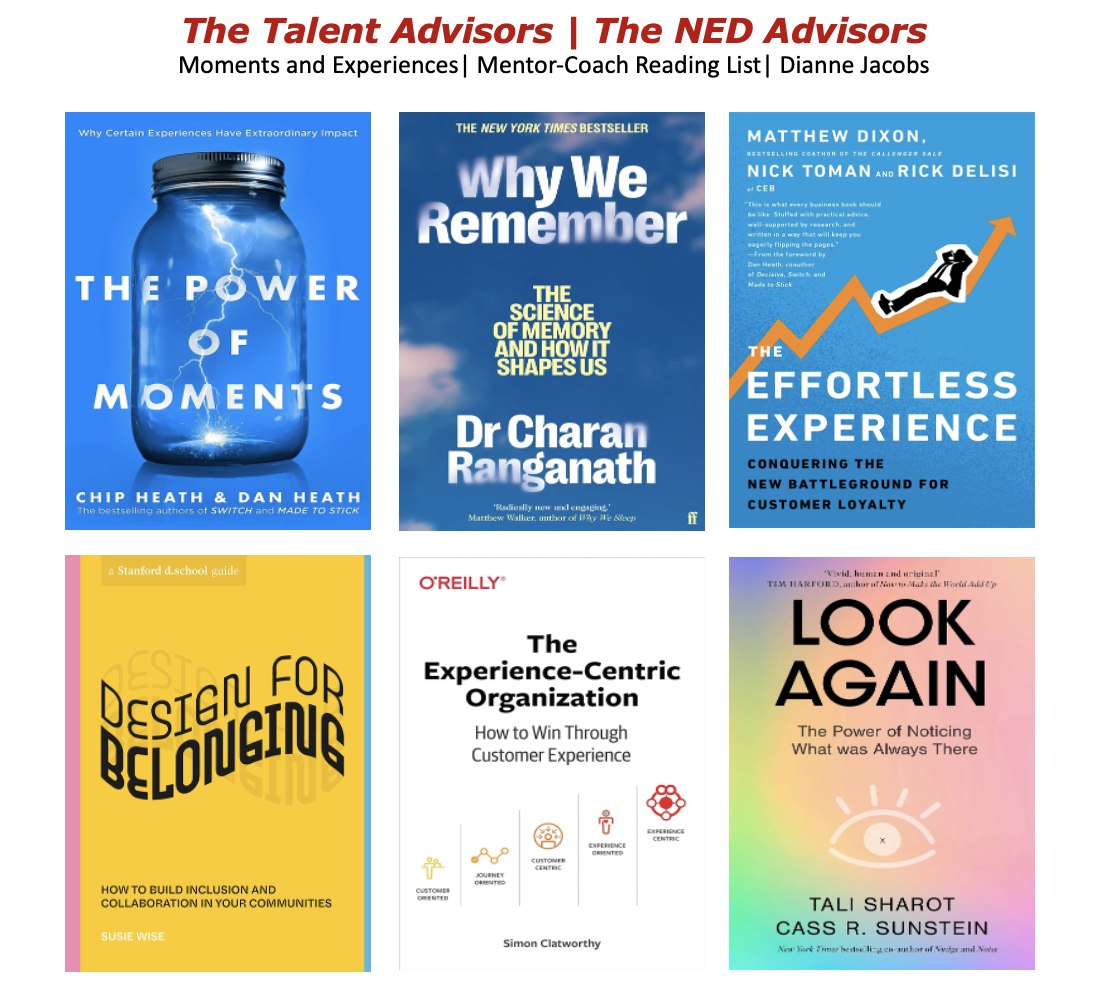Design Moments And Experiences
This article is part of our Mentor-Coach Reading List series. Join the mailing list to receive this and more.
We remember moments and experiences - as individuals, employees and customers. Those that endure help us either connect, engage and belong or disconnect, distance, limit our levels of engagement.
Experiences are important. Memories are important. Journeys and outcomes are important.
QUESTIONS TO CONSIDER
What, specifically, makes a particular experience memorable and meaningful?
Why would you want to create a defining moment?
How can you design memorable moments and experiences for others in your work and life?
What are the differences between being happy in something, being happy about something or happy with something?
How can you improve customer experience to uplift service, reduce costs and generate loyalty?
What are the ‘moments of truth’ during your customer’s journey? How do you know?
Do you listen to what your customers or other key people have to say about their experiences?
What is the underlying structure needed to design and deliver memorable experiences?
Do you understand how your customers and clients experience products and services?
How can you translate cultural trends into employee experiences?
What is needed for you to see everything anew?
DIANNE’S MENTOR-COACH READING CHOICES
Happy reading and stay curious.
The Power of Moments: Why Certain Experiences Have Extraordinary Impact (Corgie Adult) by Chip Heath and Dan Heath. explore the stories of people who have created standout moments, from the owners who transformed an utterly mediocre hotel into one a best-loved properties by conjuring moments of magic for guests, to the scrappy team that turned around one of the worst elementary schools in the country by embracing an intervention that lasts less than an hour. Filled with remarkable tales and practical insights, it shows that we all have the power to transform ordinary experiences into unforgettable ones.
Why We Remember: The Science of Memory and How it Shapes Us (Faber and Faber) by Charan Ranganath. Using fascinating case studies and testimonies, it unveils the principles behind what and why we forget and shines new light on the silent, pervasive influence of memory on how we learn, heal and make decisions. By examining the role that attention, intention, imagination and emotion play in the storing of memories, it provides a vital user's guide to remembering what we hold most dear.
The Effortless Experience: Conquering The New Battleground For Customer Loyalty (Portfolio) by Matthew Dixon, Nick Toman and Rick DeLisi. Explores how loyalty has a lot more to do with how well companies deliver on their basic promises than on how dazzling the service experience might be. Forget bells and whistles and just solve your customer's problems. It lays out the four pillars of a low-effort customer experience, with robust data, insights and profiles. Here are tools and templates you can start applying right away to improve service, reduce costs, and ultimately generate the elusive loyalty that the 'dazzle factor' fails to deliver.
Design for Belonging: How to Build Inclusion and Collaboration in Your Communities (Clarkson Potter/Ten Speed) by Susie Wise. You can use design to create feelings of inclusion in your organisation- rituals that bring people together, spaces that promote calm, roles that create a sense of responsibility, systems that make people feel respected, and more. You can't force feelings, but in Design for Belonging, author and educator Susie Wise explains how to use simple levers of design to set the stage for belonging to emerge.
Experience-Centric Organization, The: How to win through customer experience (O’Reilly Inc) by Simon Clatworthy. Shows you how to transform your organisation into one that aligns your customers' experiential journey with platforms, organisational structures, and strategic alliances. Rather than treat customer experience as an add-on to product and service design, you'll discover how experience-centricity can drive the whole organisation.
Look Again: The Power of Noticing What was Always There (Bridge Street Press) by Tali Sharot and Cass R. Sunstein. Disrupting our well-worn routines, both good and bad, can rejuvenate our days and reset our brains to allow us to live happier and more fulfilling lives. People stop noticing what is most wonderful in their own lives. They also stop noticing what is terrible. But what if we could find a way to see everything anew? What if you could regain sensitivity, not only to the great things in your life, but also to the terrible things you stopped noticing and so don't try to change?
FURTHER IDEAS AND LEARNING
WHERE IS YOUR PROBLEM-SOLVING FOCUS? Mentor-Coach Conversation | Try an experiment. Think of three problems you have faced recently. Was your response situational or default? Did you change focus when needed to ensure better solutions and pathways?
VISION TO ACTION Mentor-Coach Conversation | Whether it is an enterprise-wide strategy, a transformation plan or a key piece of work, moving from visualisation to actualisation takes a specific execution skill set, an investment in mission-critical talent, the right resource allocation, hyper focus and discipline. Certain operating styles create differentiation and impact.
LEAD THROUGH QUESTIONS Mentor-Coach Conversation | Do you have all the answers? Inquiry and curious questions makes for better problem solving, uplift value, foster learning, innovation, performance improvement and forge different paths.
FOCUS SHAPES CONTRIBUTIONS Mentor-Coach Conversation | Whether you are part of an executive team, in the c-suite or have joined the boardroom, one thing is certain, where you focus your attention and what you listen for, shapes your contributions.
CONFLICT, EMPATHY AND OPPORTUNITY Mentor-Coach Conversation | Unaddressed conflict takes on a life of its own, with sides emerging, focus diverted, wrong fights battled and the pushing of competitive bias. In high-trust cultures, people may debate rigorously, but they commit to the best overall future. Constructing the right degree of tension is the challenge.
FURTHER REFLECTIONS
If you have read Daniel Kahneman’s ‘Thinking, Fast and Slow’ or watched his related Ted Talk you may recall the notions of the ‘experiencing self’ (living and in the moment) and the ‘remembering self’ (influences choices, anticipates the future and storytelling).
Dianne’s reading list on how to Communicate To Connect
🚩 Discover the support we offer executives, new and aspiring directors.
About Dianne Jacobs | Discover how to get On Boards or Next Level | Join the Mailing List
OTHER READING LISTS | NSIGHTS FOR ACTION | COACHING CONVERSATIONS

